
How FarmVille 2 Celebrates Capitalism and Animal Exploitation
FarmVille 2 is a digital game in which players run a ‘farm’. They grow crops and keep animals which they use for their ‘products’. The game draws heavily on cultural scripts which normalise the exploitation of animals for dairy, meat, eggs or wool, thus celebrating capitalism. It also emphasises the animals’ complete dependency on human control. Through a speciesist representation of human-nonhuman animal relations, FarmVille 2 perpetuates oppressive anthroparchal models of practice.
FarmVille 2 and its Power Play
FarmVille 2 belongs to a category of digital games called agriculture simulations. It is a subgenre that has gained much popularity in recent years. These games are often available in mobile and desktop formats through social media platforms such as Facebook but can also be played on mobile apps. At the time of writing (December 2020), FarmVille 2 positions itself as a widely popular representative of this farm simulation subgenre with 13,665,817 likes on the game’s Facebook page. This still does not beat the number of Facebook likes of the game's first edition (31,879,793 - Dec 2020). However, the first edition of FarmVille uses old Flash technology which Facebook will discontinue supporting as of December 31, 2020. This, therefore, makes FarmVille 2 not only a more relevant case study for this article but also a more accessible one.
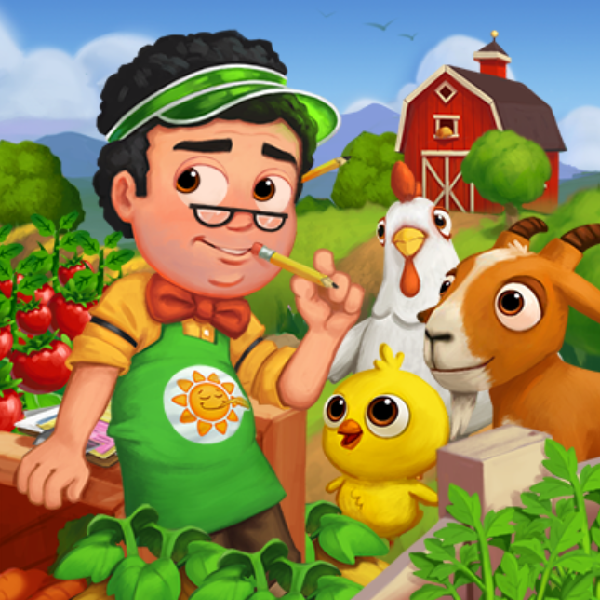
Cute capitalism, or the idyllic world of FarmVille 2
While we’re on the topic of counting likes and crunching numbers: capitalism is alive and well in Farmville 2. In fact, the stimulating force behind the game and the very motivation for players to continue playing is nothing other than capitalism itself in all its gore and glory. Which seems relatively harmless in and of itself. However, it becomes problematic once we delve deeper into the mechanisms, values and power dynamics which make a game such as FarmVille 2 possible.
Players are encouraged to earn in-game income by trading in crops and animal-derived “products” from their farm. The game equates ploughing fields, watering and harvesting crops with taking care of animals. Similarly, it equates selling a basket of tomatoes with taking away a cow’s milk or a hen’s egg and trading it for in-game coins. Naturally, these representations only echo real-world attitudes towards the exploitation of animals for human use. The game objectifies animals by treating them and what they produce as mere commodities. As FarmVille 2 reminds its players throughout the game, “The more animals you have, the more animal products you can sell for a good price”. Through such messages, the game reiterates and validates speciesist attitudes in human-nonhuman relations. In this structure, the instrumental purpose of keeping animals is not only portrayed as justified but is encouraged and rewarded.
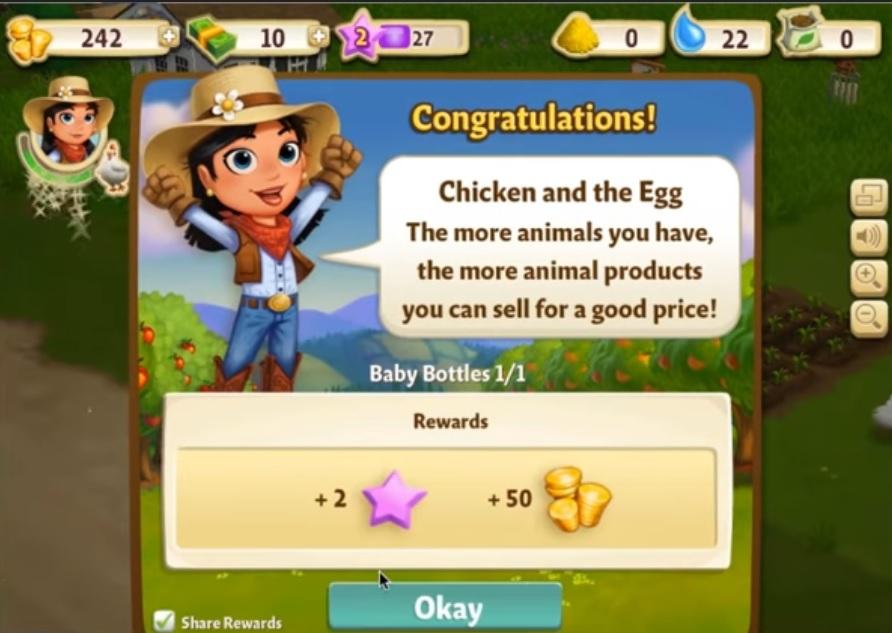
The game objectifies animals by treating them and what they produce as mere commodities. Animals are necessary for profit and to ensure rewarding gameplay.
If speciesism seems too abstract a concept to apply to FarmVille 2 and its celebration of capitalism, I suggest a hierarchal comparison. It goes as follows: human milk or hair are not commodities in themselves. They are not created by a team of product designers in order to fulfil market demand. They simply exist and if one makes them into products to be traded and made a profit off of, then they become marketable goods. The same goes for non-human milk, eggs, skin, wool or feathers. They are not commodities in themselves and have no inherent market value. They are not meant for anyone’s use except for the animal’s that they belong to and perhaps that animal’s offspring. But when human "goods" such as hair, skin or internal organs do make it onto the market, it is considered unethical if they were obtained by coercion or without asking the human they belonged to for permission.
Yet, when it comes to the skin, hair or milk of non-human animals we do not apply the same standards. What is required for animal "goods" to become tradeable products is a system which has socialised its members into believing that it is not the same to make handbags from human skin and to make them from the skin of cows. After all, there must be some sort of hierarchy in place, speciesists will say. FarmVille 2 highlights, even celebrates, this speciesist value system.
The Cycle of Farm Life
In fact, it even goes a step further: in the game, animals are shown as compliantly giving up their “products”. Quiet accomplices to their human-decided fate. The game operates on deeply embedded anthropocentric values. It propagates a system according to which all non-human beings, sentient or not, can be instrumentalised, objectified and commodified for human gain. Animals in FarmVille 2 are not individual beings, they are collectively referred to as livestock and are just another element necessary for the expansion of one’s farm. Players are lured in by the eternal promises of capitalism: profit and expansion.
Within this optics, the rhetorical question posed to the player “Feeling the cycle of farm life yet?” might be perceived as disturbing, if not completely distasteful or cruel. The instance that the premise of FarmVille 2 originates in the natural order of things is misleading: the utopian, idyllic image of a Western farmer cultivating “his” land is in reality the epitome of civilization and has very little to do with natural laws (Cole and Stewart 2017, 405).
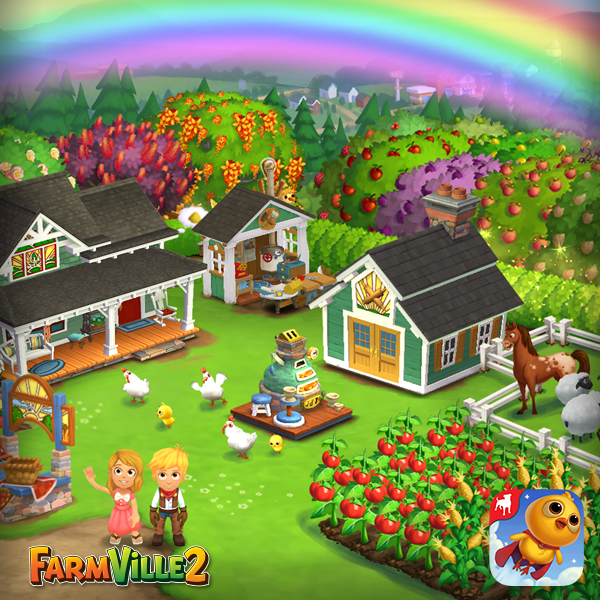
Players are lured in by the eternal promises of capitalism: profit and expansion.
If there is any life to be found in this money-chasing dream, the game reminds us what it is: “Feed animals to get their goods to sell for coins!”. Such is, therefore, the “cycle of farm life” players are made to believe to be part of: humans feed the animals they “own”, mysterious laws turn consumed animal feed into animal “goods”, humans claim those goods as theirs and sell them or use them in recipes in the farm house kitchen. This paints a picture of animals as “naturally” inferior. The message in FarmVille 2 is clear: profits are what makes you successful in the game and you can only attain enough profits and pass to next levels if you comply with the power dynamics explicitly present within the game. FarmVille 2 offers no possibility to avoid exploiting animals for their “products” if one wishes to achieve targets and to ensure rewarding gameplay.
In the worldview celebrated by FarmVille 2, human control euphemised as care, is not only unopposed but desired.
In all of this, animals are represented as units of production, with no needs apart from hunger, no social lives, no sense of family relations, indeed, with no need to find suitable mates and to reproduce. Baby animals do appear in the game but not by way of natural pregnancy and birth: they can only be purchased. Chicken eggs, for instance, are never anything other than products to be sold or used to make other products to be traded for even more in-game currency.
Human Control and Cute Capitalism
What is more, the game supports the popular belief that animals would not survive without humans. Farmers (or players) are, therefore, essential to sustain the lives of animals who, grateful to their caretakers, repay with their “goods”. But this again is misleading as it presupposes that the “transaction” is mutual and that it benefits both parties equally. Which, of course, it doesn’t. But FarmVille 2 subscribes to and perfectly reflects the anthroparchal structure in which humans have all the rights while animal rights are ignored. A reflection upon what rights the animals might have would upset the speciesist order of gameplay or worse – of society. In the worldview celebrated by FarmVille 2, human control euphemised as care, is not only unopposed but desired.
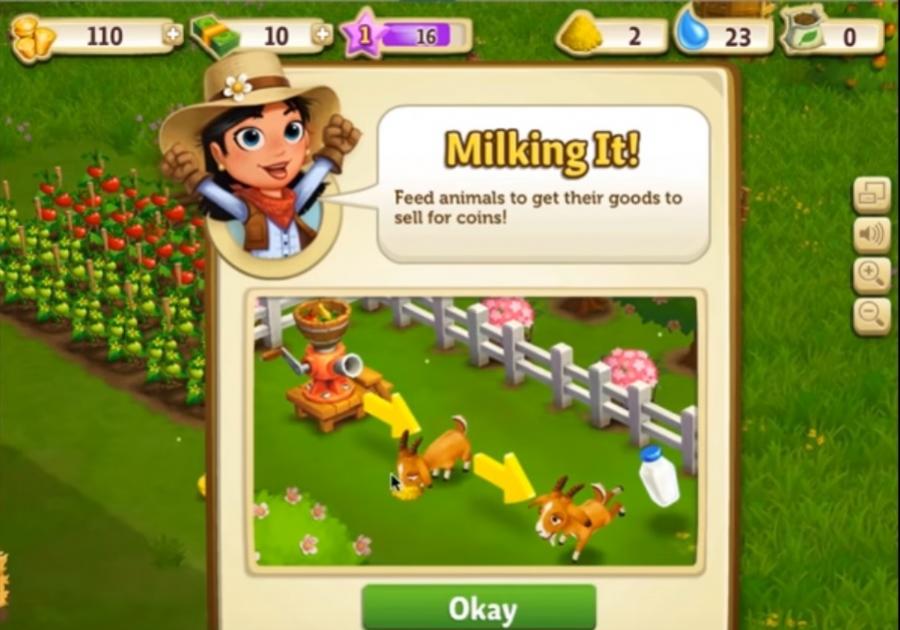
The cycle of life as portrayed in FarmVille 2
What is more, much like the dairy and meat industries, FarmVille 2 normalises the exploitation and control of the female reproductive system. As already mentioned, animals in this game seem to be happy to give up the milk intended for their calves (like human mothers, cows and goats, too, naturally only lactate when they have to feed their offspring). This is never connected to any suffering or discomfort, either physical or mental. If anything, the animals of FarmVille 2 cannot stop smiling.
This suggests a phenomenon which Cole and Stewart (2014) have theorised as the “cutification of capitalism”. Disproportionately large eyes and smiling bring to mind the “cute” anthropomorphised animals portrayed in children’s literature or media. The intentional portrayal of animals as “cute” can be related to the objectification of women with pressures to look “pretty”. It reiterates the idea that in order to please or to be acceptable to their “target audience”, animals (or women) should look a certain way. This is built on the anthroparchal belief that non-human animals are inferior to human animals and only exist for human satisfaction.
Flesh and Blood, or Lack Thereof
Eating animal “goods” is a social norm. The very society which invented this norm (ultimately, all norms are inventions, mere constructs) does everything in its power to sustain it. It does so through a variety of media, cultural texts, educational and socialisation processes or marketing strategies. The idea that eating animal-derived products is normal is reinforced also in FarmVille 2. However, it is worth noting that the game draws the line at consumption of animal flesh. This is an interesting operation and one which differentiates FarmVille 2 from other agriculture simulation games on the market. Most animals in this game are not used for their flesh.
FarmVille 2 fails to show the very reality it claims to base its premise on: the reality of farming.
As far as the circle of life goes, FarmVille 2 seems to have its own narrow definition of what that means within the context of gameplay. Because not only are animals not used for meat production, animals in FarmVille 2 never die. In this utopian, idyllic, ever-sunny game world, there simply is no death. Animals are not killed for their flesh but they also do not die of natural causes. Similarly, there is also no portrayal of animal confinement or suffering. And with the depiction of animals as willing participants in their own exploitation, FarmVille 2 fails to show the very reality it claims to base its premise on: the reality of farming.
Irony, Irony…This Hate and Love
All products derived from the player’s farm can be used in recipes in the farm house kitchen. The basic version of the game does not offer any recipes which would require the flesh of mammals or birds. However, veganism is also not an option for a successful FarmVille 2 player as many recipes still require animal eggs or milk. While the game does not engage in any form of explicit or implicit slaughter of animals such as cows, chickens, pigs, goats, horses or dogs, it still reinforces a very strong speciesist attitude when it comes to fish.
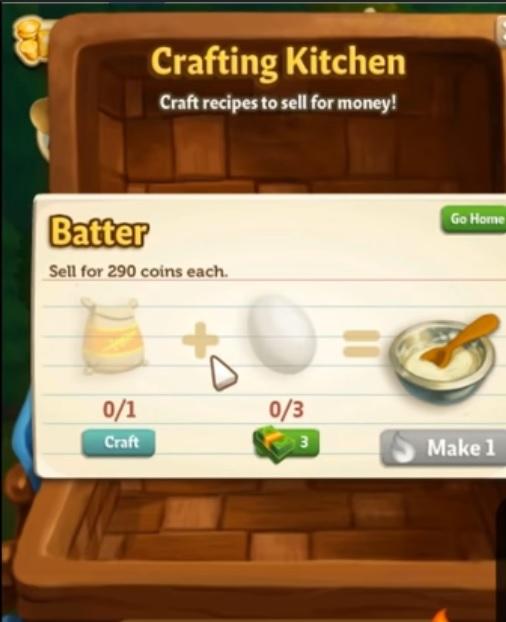
Veganism is also not an option in FarmVille 2 as many recipes require animal eggs or milk.
This is not necessarily anything that distinguishes FarmVille 2 from the hierarchical system in which it operates. If anything, the game has managed to perfectly portray the full scale of speciesism prevalent in Western societies. Fish, even more than “livestock” animals, are not considered as individuals worthy of moral consideration and respect. Smaller fish and crustaceans are used as bait in FarmVille 2 and bigger fish are caught and used in the farm house kitchen or, naturally, traded for coins. The game seems to offer fish options as alternatives to animal dishes supporting and reiterating the widespread belief that fish can still be part of a kind and compassionate diet. All of this supposedly in tune with the “cycle of farm life”.
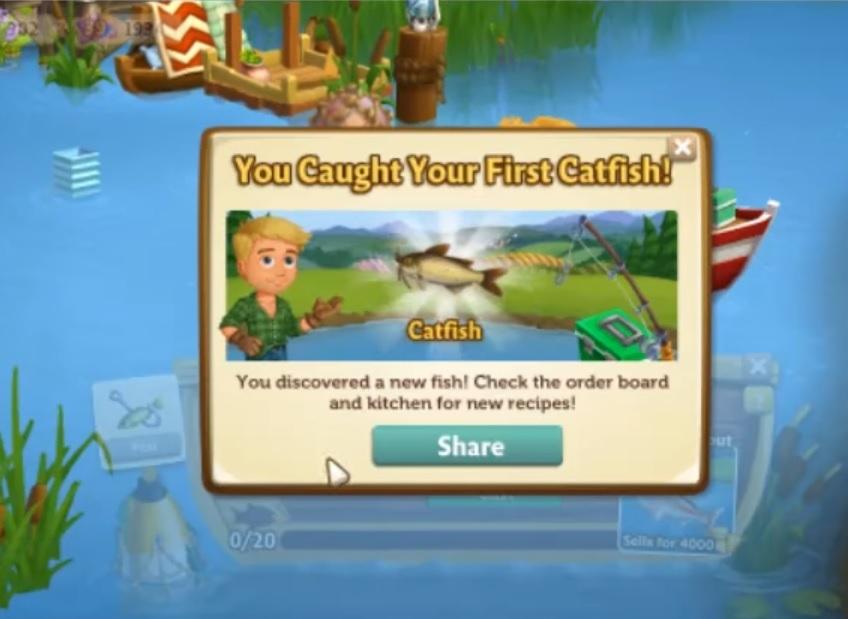
Smaller fish and crustaceans are used as bait in FarmVille 2 and bigger fish are caught and used in the farm house kitchen or are traded for coins.
All Animals Are Equal but Some Are More Equal Than Others
We have already encountered two categories in the hierarchy of non-human animals depicted in FarmVille 2. The first is “livestock” animals who players should use for their “goods” but whose flesh is not eaten in the game. The second is fish whose position is subordinate to other animals and whose flesh can be eaten as part of the questionably compassionate diet promoted in the game. While these two are already clear markers of speciesism, FarmVille 2 does not fail to reflect the entirety of the power dynamics which form the basis of oppressive practices. The game introduces pets. These, as Western world order would have it, are limited to dogs and cats.
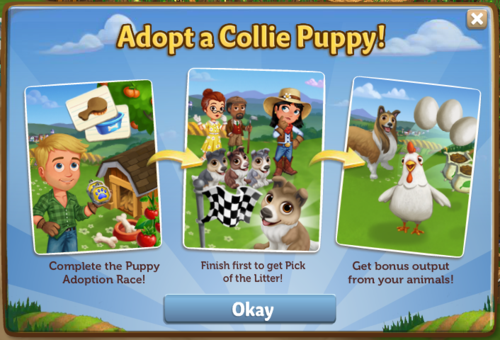
The game echoes the view that there are certain animals worthy of love and kindness but there are also animals who can be exploited for the “output” they produce.
Dogs can be used in running the farm and can help the player to “get bonus output from [their] animals”. The game echoes the prevalent view that there are certain animals worthy of love and kindness but there are also animals who can be exploited for the “output” they produce. If used for anything other than companionship, dogs are employed to actually help humans control other species of animals. On the one hand, then, dogs are portrayed as higher on the social scale than “farmed” animals. On the other hand, however, they are still working animals not unlike the herd of goats who appear in order to clear space in the fields whenever the player wishes to expand their ranch.
The message FarmVille 2 perpetuates is that animals exist for human gain and satisfaction
As players of FarmVille 2, we feel justified in maintaining this hierarchal order of species as the game presents it as a natural and harmonious way to live with other animals. The message the game perpetuates is that animals exist for human gain and satisfaction, they are commodities or tools whose worth is based on their level of usefulness for humans. These relations are purely instrumental and they reinforce the idea that humans possess agency while animals do not. This is why, as the game presents it, animals need human control as people certainly know their “livestock’s” needs better than the animals do themselves (Stewart and Cole 2014, 140).
You Are What You Consume
As is evident, FarmVille 2 simultaneously reflects and conceals dominant practices of animal exploitation and speciesist attitudes. But one might wonder: why does it matter? As Cole and Stewart point out in their study on the ways in which children are socialised into dominant modes of thinking regrading animals, it is crucial to realise the “interconnectedness of representation and practice" (Cole and Stewart 2017, 404). Agriculture simulation games can be part of the socialisation process of children and young people reassuring them of the legitimacy and normalcy of a system in which non-human animals are used for human gain. For adults, on the other hand, games such as FarmVille 2 provide a “celebration of their habituation” to a speciesist world in which not all beings are granted equal moral consideration (Stewart and Cole 2014, 146).
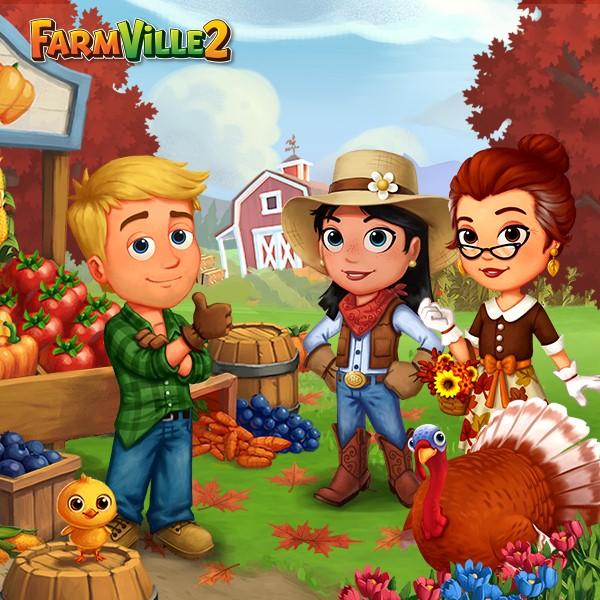
As players, we feel justified in maintaining this hierarchal order of species as the game presents it as a natural and harmonious way to live with other animals.
FarmVille 2 is a digital interactive narrative to the unfolding of which consumers have the chance to contribute. Insofar as it is an unfolding story, the ideological influence the game exerts upon its players can be compared to narratives found in other media. The power of animal stories to influence attitudes towards other species has been explored in a recent publication, Human Minds and Animal Stories. What we are exposed to as media consumers matters. The narratives we consume contribute to shaping our view of the world and our interaction with it. The beliefs and practices we are socialised into as children are likely to remain with us into adulthood. However, it is crucial to remember that this does not necessarily mean that they cannot be unlearned.
Speciesism can and must be unlearned and challenged.
Games like FarmVille 2 go to show the extent to which Western societies have normalised speciesist thinking and nonhuman animal exploitation. But speciesism, like all beliefs and value systems, can and must be unlearned and challenged. The cycle of life, seemingly so celebrated in these types of games, need not discriminate against forms of life which are different from the human form.
References
Cole, M., & Stewart, K. (2017). ‘A New Life in the Countryside Awaits’: Interactive Lessons in the Rural Utopia in ‘Farming’ Simulation Games. Discourse: Studies in the Cultural Politics of Education, 38(3), 402-415.
Malecki, W., Sorokowski, P., Pawlowski, B., & Cienski, M. (2019). Human Minds and Animal Stories: How Narratives Make Us Care About Other Species. Routledge.
Stewart, K., & Cole, M. (2014). Our Children and Other Animals: The Cultural Construction of Human-Animal Relations in Childhood. Ashgate Publishing, Ltd.